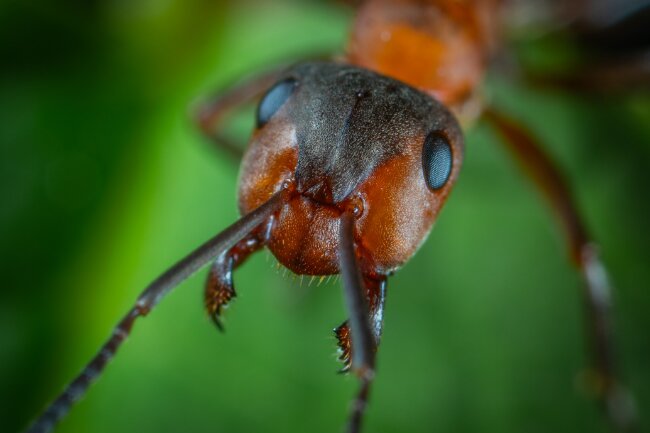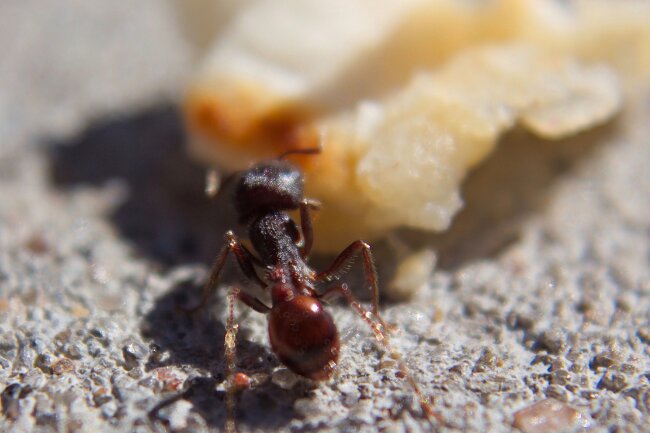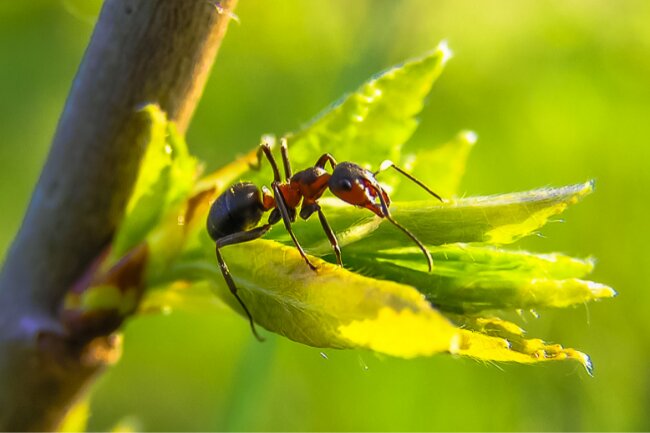There are around 12,000 species across the world, with a wide range of diets. Some ants are very specific in what they will feed on, while others will eat whatever foods they can come across. Depending on the species, ants can eat meat, grains, fruits or even the honeydew produced by other species.
Contents
When and how do ants eat?

When ants eat depends on the species, as ants can be both nocturnal (active at night) and diurnal (active in the day). Other considerations can be the time of year, as many species become less active in the winter, and the weather conditions, as they will often remain within their nests or in shelter during very hot weather or rain.
However, aside from these restrictions, most ants do not have a set meal time. They will eat as and when they find food, or food is brought to them. The queen and larvae will be fed regularly by the workers, who regurgitate food from their crop, or carry in larger pieces in their mandibles.
| Diet Category | Description |
|---|---|
| Omnivorous | Ants that consume a wide variety of plant and animal matter |
| Herbivorous | Ants that primarily feed on plant material |
| Carnivorous | Ants that mainly feed on other insects or small animals |
| Fungus Cultivators | Ants that cultivate and feed on fungus |
| Necrophagous | Ants that scavenge and feed on dead animals |
When workers eat themselves, they will break up their food with their mandibles, or suck it up if it is liquid food. The food will then enter their digestive system, where it will be consumed.
Also read: 10 Different Methods That Explain How Ants Survive the Winter
What do ants eat?
Depending on the species, ants can eat a wide variety of foods. Here are a few examples.
| Ant Species | Preferred Food Sources |
|---|---|
| Carpenter Ants | Sugary substances, insects, and honeydew from aphids |
| Harvester Ants | Seeds and plant material |
| Fire Ants | Insects, seeds, plant material, and carrion |
| Argentine Ants | Sweets, honeydew from aphids, and dead insects |
| Leafcutter Ants | Fungus grown on leaf fragments and specialized fungal gardens |
| Army Ants | Other insects, small animals, and carrion |
| Weaver Ants | Insects, nectar, and plant sap |
| Pharaoh Ants | Sweets, proteins, and fats |
| Acrobat Ants | Honeydew from aphids, nectar, and small insects |

Other insects
Though tiny, ants can pack a surprising punch. As well as their mandibles, with which they can nip and grab their opponents, they also have a venom that they can either spray or inject, which can be irritating or painful depending on the species.
Army ants are some of the best known meat eaters, and are often able to overpower much larger animals by surrounding them and pinning them down. As well as hunting animals for meat, ants will frequently eat dead animals they find.
Grain and seeds
Grains and seeds are excellent energy-rich sources of food. They are also plentiful and relatively easy to collect. Fascinatingly, Florida harvester ants have even added an extra process to their seed harvesting, planting the seeds first and then eating them once they have germinated, therefore having become softer.
Fruits
There are few ants that specialise in eating fruits, but many will take advantage of these sugar freebies when possible. Many fruits have hard skins in order to discourage insects from eating them, so an ant’s best chance will usually be once the fruit has begun to rot or fallen to the ground.
Honeydew
Honeydew is an excretion created by certain sap-sucking insects in order to extrude excess sugars and liquid. Many species have learnt to feed off these excretions, but perhaps none have developed the levels of sophistication that ants have. Ants have learnt to farm the insects they collect honeydew from.
Not only do they protect them from predators, they also herd them, moving them to more suitable feeding ground. Yellow meadow ants have been seen to move aphids into their nests for the winter to keep them safe, and then back out to pasture. They’ve also been found to selectively remove underperforming individuals to strengthen the herd.
Fungi
When it comes to farming ants, leafcutter ants do it on an industrial scale. Each day, these busy ants head out and cut out pieces of leaves, carrying them back to their nest. There they feed the leaves to a fungus that they grow within their nest. It is the fungus they then feed from. When setting up a new nest, they will bring a piece of the fungus with them to re-establish it.
Human food
When it comes to tasty snacks, we humans have become pretty good at producing them. Many wild animals have learnt to take advantage of our food, either when it is improperly stored, littered or thrown away. Ants, being particularly small, are great at getting into small cracks or places we don’t expect them. From fruit, to bread, to sugar, they’ll happily take advantage of these delicious foods.
Blood
One particularly unusual ant species is the Dracula ant. These ants feed solid foods to their larvae and then bite a hole into their young, feeding on the blood. Certainly a gruesome meal, but also an interesting evolutionary development.
Also read: Do Ants Carry Disease? Can it Affect Us & How?
Water
Most of the time ants will get enough water from their food, however, they will drink water at times. Usually this will be in the form of rain droplet or dew.
Hungry for More

As individuals, ants will not eat large amounts, but as a colony they are constantly consuming. From feeding their queen, their larvae, and then all the thousands of workers, there is a constant need for the workers to be heading out and looking for more and more food.
While we often view this as a negative thing, eating us out of house and home, ants also preform a vital process such as cleaning up dead insects and cutting back vegetation. They are part of a natural food change and balance. While we may not always understand or see their impact, it is surprisingly wide-reaching.
FAQ
How do queen ants eat?
Queen ants are largely fed by the worker ants. When they are newly emerged they will head out on their mating flight, find a male and then head off to start their own colony. Once have established a workforce, they will no longer leave the nest, and their workers will bring them food to eat. What food this is will depend on what that species of ant eats.
Also read: Here’s “How Ants Become Queens” – FAQ
Do ants eat other ants?
Ants live in large, complex societies, which rely heavily on the cooperation of one another to work as a whole. For this reason, ants will not generally eat their nest mates. However, many species will more than happily attack and eat other ants if given a chance. This doesn’t necessarily need to be a different species of ant, simply a foreign ant that is not one of their own.
Raiding parties aren’t unusual, where ants attack other nearby nests. One fascinating ant, the slave-making ant, will even capture and enslave other ant species.
Do ants eat worms?
Most ant species don’t both attacking worms, either because they don’t eat meat or because the worms are too big to be easy to tackle. Some larger predatory species will attack worms if they come across them. Army ants are very adept at pinning down larger animals and cutting them into manageable pieces.
However, such tactics are hard to utilise underground and worms are likely to retreat into the soil if confronted by an angry ant. More likely, however, is that an ant will take advantage of an already deceased worm, as a good source of protein.
Do ants eat honey?
Many species of ant are very opportunistic feeders and will take advantage of most things. Honey, as high energy food, would certainly be very appealing. However, most natural honey is protected by very angry bees, much larger than the ants that might wish to feed on it. Rather than carrying out a daring raid, ants are far more likely to encounter honey that humans have accidentally spilled or incorporated into other foods.
Do ants eat grass?
Many species of ants eat grass grains, and can be seen climbing up grass stems to gather this food. There are no species that eat the grass itself, however.
Do ants eat wood?
Carpenter ants are well known for their wood destroying habits, burrowing into wood and leaving behind nothing but shavings. However, while the ants may cause plenty of destruction, they do not actually eat the wood, simply disposing of it.
Do ants eat termites?
Termites are often confused for ants due to their similar habits and looks, however though related they are very distinct species. Some ant species will happily attack and eat termites if given the chance.
How long do ants live without food?
How long it takes an ant to die without food depends largely on the species or other health factors for the ant.

